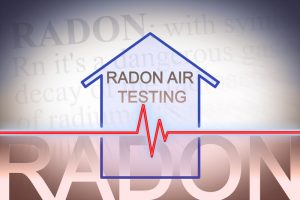Radon is one of those terms you hear in conjunction with homes, particularly when buying and selling, but you may not understand why. The reason you hear about radon in conjunction with homes is that radon can be a serious problem. The EPA estimates that 1 in 15 homes has unhealthy radon levels. Radon infiltration isn’t specific to a geographic area, type of home, or climate. So how do you know if your home is safe? Call Clean Air Act and make an appointment for radon testing in Troutdale.
What Is Radon?
Radon is a natural byproduct of uranium breakdown in soil, rocks and water. It is an invisible odorless and radioactive gas that can cause lung cancer. In fact, radon is the number two reason why people contract lung cancer; cigarette smoking is number one. Radon is found mostly in air but it can also be found in water.
Where Is It Located?
Radon can be located just about everywhere: large buildings, small buildings, old buildings, new buildings – basically anywhere you can find rocks, water and/or soil. The problem with radon in buildings is that it can get trapped inside, and once it is trapped it can become concentrated. The good news is that there are safe levels and radon, and most people’s properties do fall into the safe category. Radon is measured in picocuries per liter (pCi/L), and to be considered safe, your home should not have a radon rating of more than 4 pCi/L. If it does, you will need to hire professionals to perform radon mitigation.
How Does Radon Get Into Homes?
These are the ways radon can enter your home:
- Empty spaces in walls
- Flooring cracks (in solid flooring)
- Your water
- Gaps between floors
- Wall cracks
- Joints
Mitigation
If radon is found in your home or in your water supply, the radon can be treated successfully. With water issues, point-of-use or point-of-entry devices can be used to filter out the radon from your water. Treatments for radon found in the air can vary, but one of the most common treatments is to use a vent pipe and a large fan, commonly known as a soil suction radon reduction system. This type of system pulls radon from beneath your home and expels it to the outside air. Other treatments include sealing cracks, creating better ventilation and using suction in other areas of your home.
Radon can be a serious problem. If you haven’t had a radon test, or have and need radon mitigation for your Troutdale home, call the trained professionals who can help: Clean Air Act.
 You know your ducts are clean and your HVAC system is working nicely. The house is comfortable and you have been enjoying relaxing as winter slowly gives way to spring. We don’t want to ruin the mood, but we do want you to keep safe, so we want to ask you a question: with everything you’ve done for your home’s indoor air quality, did you check for the presence of radon?
You know your ducts are clean and your HVAC system is working nicely. The house is comfortable and you have been enjoying relaxing as winter slowly gives way to spring. We don’t want to ruin the mood, but we do want you to keep safe, so we want to ask you a question: with everything you’ve done for your home’s indoor air quality, did you check for the presence of radon?
 Whatever you do, don’t panic! Consumers buy homes all the time that end up having radon problems. If the story ended there, it would be all over the news and we’d have a catastrophe on our hands. The reality is that there are many solutions to this kind of problem in your home, and with proper testing and mitigation, you can be as radon-free as any other home in your neighborhood. Have you stopped panicking yet?
Whatever you do, don’t panic! Consumers buy homes all the time that end up having radon problems. If the story ended there, it would be all over the news and we’d have a catastrophe on our hands. The reality is that there are many solutions to this kind of problem in your home, and with proper testing and mitigation, you can be as radon-free as any other home in your neighborhood. Have you stopped panicking yet? No matter where you are, if you turn on a Geiger counter, you’re going to hear a steady but infrequent pattern of clicks. This is termed background radiation and is completely normal. It is what’s found in the environment and comes from natural sources like cosmic radiation and naturally occurring materials such as radium or radon.
No matter where you are, if you turn on a Geiger counter, you’re going to hear a steady but infrequent pattern of clicks. This is termed background radiation and is completely normal. It is what’s found in the environment and comes from natural sources like cosmic radiation and naturally occurring materials such as radium or radon.
Join Us Online